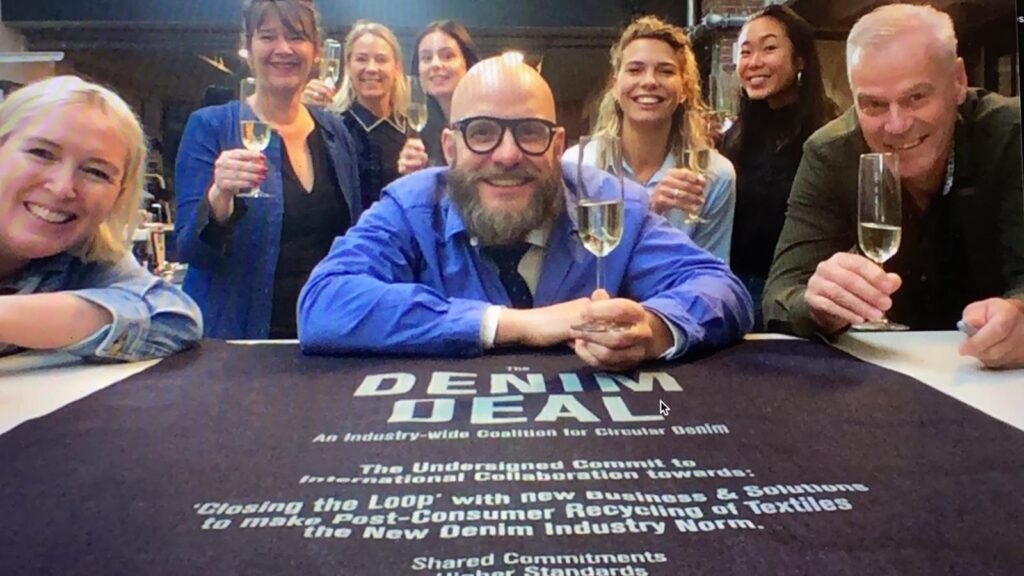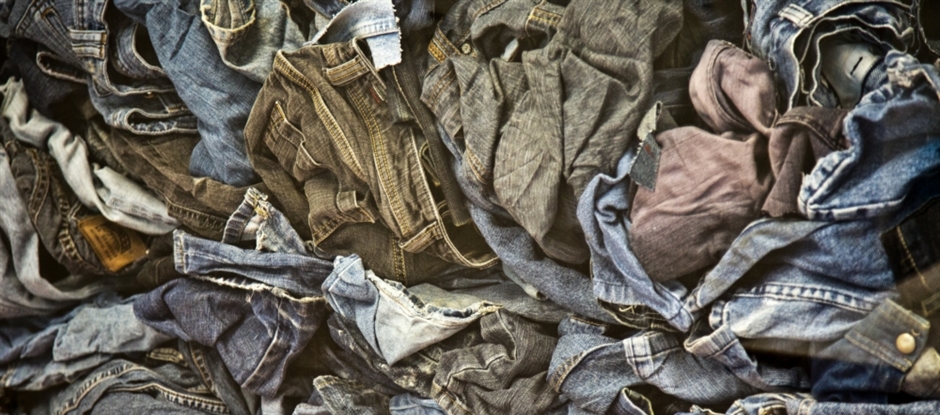Major jeans brands from Amsterdam, such as Kings of Indigo, Scotch & Soda, Kuyichi and MUD, signed the Denim Deal in October 2020 and agreed to make three million jeans garments containing at least 20 per cent recycled textiles in the upcoming three years. Together with more than thirty players, Wieland Textiles is one of signatories of this deal. “This alliance can have an enormous impact. If we are able to make circular jeans, there is no reason not to do the same with other post-consumer textiles,” states Hans Bon, Director of Wieland.
Discarded clothes as raw materials for new jeans. In the Autumn of 2020, popular jeans brands from Amsterdam promised to make much more jeans garments containing recycled textile waste. In order to realize this, post-consumer textiles will be cut into pieces and ripped apart into cotton fibers, of which companies in Turkey will spin new yarns, to be re-used for the production of new circular jeans. A crucial link in this textile chain is Wieland Textiles, which has the capacity to sort over nine million kilo of garments out of the containers from companies, such as HVC and Leger des Heils ReShare. Director Hans Bon is happy with the fact that all relevant players in the chain – jeans brands, collectors, sorters and weaving companies – join forces for the first time and are taking up the challenge for a cleaner wardrobe together. Bon has lobbied for years to make this happen. The Dutch authorities want to make a major step towards to a more sustainable textile industry and, as a consequence, the jeans brands are becoming more and more aware of the urgency of this transition.
State Secretary Van Veldhoven (circular economy and environment), is working towards a circular economy in 2050, in which (textile) waste will no longer exist. Bon: “After twelve years of hard work with the optimization of our Fibersort technology, the transition is gaining momentum, because the government is urging producers to act. In the Green Deal Circular Denim, Van Veldhoven has stipulated that in 2025, every garment should contain at least 25 per cent recycled textiles. The Denim Deal is the reflection of those ambitions and sends a clear message to the textiles industry.”

From left to right: Imogen Nulty (Scotch and Soda), James Veenhoff (House of Denim) en Hans Bon (Wieland Textiles) – foto: ©Denim Deal
From a poor man’s trousers to popular fashion item
The decision to make a start with denim garments is no coincidence, stresses Bon. “We all wear jeans and that makes it very recognizable for consumers. Van Veldhoven has used the popularity of denim garments in a smart way by joining forces with James Veenhoff, founder of House of Denim – a platform that aims to build an international network for industry-wide collaboration on standards, projects and resources for a more sustainable denim industry – and he Metropolitan Regio of Amsterdam to show the sector that the Denim Deal can function as a catalyst for a more sustainable textile industry,” he explains. “This alliance can have an enormous impact, because if we are able to make circular jeans, there is no reason not to do the same with other post-consumer textiles. Jeans is a complex product. Originally, denim was used in the States to make working clothes, so it had to be strong. Therefore, denim is made out of very hard, twined yarns to ensure a very hard and lasting fabric,”, states Bon. Throughout the years, jeans has transformed from a ‘poor man’s trousers’ to a very popular fashion item. According to Bon, this also means that circular jeans should have the same quality and price as regular jeans. “The production of circular denim products requires high-quality feedstock. If we are able to produce three million jeans garments containing at least 20 per cent recycled textiles in the upcoming three years, we should be able to do the same with other garments as well”.
Catalyst for a more sustainable textile industry
According to Bon, the Denim Deal is a good testcase to prove it is possible to move towards a circular textiles industry. “There are no arguments left not to embark on this journey. The Denim Deal can raise awareness about the urgency of this transition, not only for consumers, but also for producers. For a long time, there was a lot of unwillingness to make steps towards a circular textiles chain. Producers came up with all kinds of excuses: it was to costly, the colours and chemical composition were not good or the volumes were not inadequate. Nonsense of course, manufacturers should clean up there own mess instead of focusing on profit maximization. There is no reason not to be part of this transition and with Fibersort we have a technology that enables this. The companies at the end of the chain – collectors and sorters – are the ones that have put this train in motion. James Veenhoff also has played a crucial role and has convinced producers and jeans brands to embark on this journey. Producers are checking in now as well and that is great step forwards”.
‘Designed for circularity’
This is a very crucial step, whereas most consumers still are not willing to buy circular clothes. Bon: “Fast fashion chains are still very popular, in particular amongst the young generation. But those players are responsible for the huge pollution caused by the textiles industry. If you make a shirt for 2 euro it will be worn-out and discarded in no time. The consumer does not ask himself how it is possible that garments are produced at such low prices. Therefore, it is crucial to make products already in the design phase suitable for up-cycling into new circular garments”.
Fibersort: ‘breeding ground’ for circular textiles industry
According to Bon, the Denim Deal is a major step in the right direction. Over thirty parties join forces to close the loop. Wieland is a crucial link within this chain. Its Fibersort machine in the factory in Wormerveer is a Near Infrared (NIR) based technology able to fully automatically and categorize textiles in 90 different fractions in a split second, based on their fiber composition, structure and color. Over the past few years, the technology has been optimized, tested and validated to prepare it for commercialization. The Fibersort is now able to sort 900 kilo of post-consumer textiles per hour. Jeans manufacturers can be sure that they will be provided with 100 per cent cotton fibers, even if the discarded garments contain materials such as acryl, elastane and polyester. “Fibersort is a ‘breeding ground’: we show producers the possibilities and that there is an interesting business case. We deliver new feedstocks to producers at the front-end of the denim chain in order to close the loop. We call these post-consumer clippings. Worn-out garments are being cut, new yarns are woven for the production of new textiles or knits,” Bon explains. “We are not ready yet to take-off the buttons, zippers and labels ourselves; this is done in Turkey. We intend to invest in so-called trim-clean technology that will enable us to remove those buttons, zippers and labels ourselves, which will make those transport movements unnecessary. The labels are the most important: we would like to have the use of polyester labels in cotton or wool garments to be fully abolished or at least to be made circular, which means it is made of the same material as in the garment. If we would be able to do this, it would be revolutionary. We expect to implement this technology in the second half of 2021”.
Listen to the podcast below, in which James Veenhoff, founder of House of Denim, elaborates on the Denim Deal and om the specfic contribution of Wieland by means of its Fibersort technology.
The ecological footprint of the textiles industry
Denim garments are a part of our daily lives. In the Netherlands, over 21 million pears of jeans are being sold every year. Worldwide only 63 per cent of the produced jeans is being sold. Which is regrettable, because it takes 8,000 litres of water to make one pair of jeans and the total emissions from the textile industry worldwide are more than all emissions from international air and sea transport together. Only 0,1 per cent of all discarded garments is re-used to make new products.
The Denim Deal will run for three years as an alliance of international frontrunners in the denim industry, sharing the ambition to introduce a new standard for the re-use of recycled textiles in new denim garments.
Source: Green Deal Circular Denim

